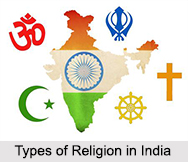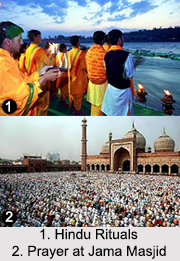 Types of Religion in India originated in Indian sub-continent. India is the land of spirituality and philosophy and is considered to be the birthplace of many religions. Indian religion is varied in approach and different in meaning. The major religions of India are Hinduism, Islam, Sikhism, Christianity, Buddhism, Jainism, Zoroastrianism, Judaism and the Baha"i Faith. Religion adds meaning and purpose to the lives of the people. It is actually a practice that enhances direct communication with God. A religion is a belief concerning one or more deities and incorporating rituals, ceremonies, ethical guidelines and life philosophies. Thus, religion has diversified and grown to include major monotheistic religions in the country. A wide assortment of religions exists in the country today.
Types of Religion in India originated in Indian sub-continent. India is the land of spirituality and philosophy and is considered to be the birthplace of many religions. Indian religion is varied in approach and different in meaning. The major religions of India are Hinduism, Islam, Sikhism, Christianity, Buddhism, Jainism, Zoroastrianism, Judaism and the Baha"i Faith. Religion adds meaning and purpose to the lives of the people. It is actually a practice that enhances direct communication with God. A religion is a belief concerning one or more deities and incorporating rituals, ceremonies, ethical guidelines and life philosophies. Thus, religion has diversified and grown to include major monotheistic religions in the country. A wide assortment of religions exists in the country today.
Hinduism in India
Hinduism is the ancient among all other types of religion in India. It is supposed to have developed about 5000 years ago. The most dominant religion in India today is Hinduism. It is more of a philosophy which is a way of living according to the understanding of the principles of Vedas and Upanishads. Hinduism is a colourful religion with a vast gallery of Gods and Goddesses. It originated with Brahmanas the central Lord. Around 80 percent of the population of India follows Hinduism. Hinduism is a major Indian religion that is divided into various schools according to different faiths and principles.
Jainism in India
Jainism is a self-help religion that relies on the self instead of Gods. The Jain religion is traced to Vardhamana Mahavira. This religion is all about promoting equality between humans, animals and plants those have souls. Jainism chronologically preceded the religion of Buddhism. It is considered as one of the oldest religions of India. Jainism starts with two principles, the living (jiva) and the non-living (ajiva).
 Buddhism in India
Buddhism in India
Lord Buddha was the one who was responsible for propagating the doctrines of Buddhism. Buddhism leads the human mind to the process of attaining enlightenment through kindness, love and wisdom. Buddhism is a philosophy and a religion that encompasses a wide variety of beliefs, practices and traditions that are chiefly based on the teachings of Gautama Buddha.
Sikhism in India
Sikhism was established in the 15th century in India. This religion was introduced by Guru Nanak. It stresses on the devotion of God. Service to mankind, hard work and dedication towards family life are also important principles of the religion.
Christianity in India
Christianity came to India with the coming of Portuguese. Christianity is an Abrahamic religion which is cantered on God, Jesus Christ and the Holy Spirit. It constitutes about 2.3 percent of the total population of the country. Christmas is the major festival of Christians. Good Friday, All Souls Day and Easter are some other festivals celebrated by the people of this religion in the country.
 Islam in India
Islam in India
Islam is a religion which originated in the country with various invasions. The Muslims are spread about 12 percent of India"s population. Though India"s contact with Islam had begun much earlier, the real push came in the 8th century when the province of Sindh was conquered. The first preachers of Islam in India were individuals who propagated Islam as a holy precept.
Other Religions in India
Judaism is considered a faith of action and is based on the covenant relationship between God and the chosen Jewish people. Baha"i religion grew out of Islam and is one of the youngest religions in the world. Zoroastrianism is the smallest religion existing in the World as well as in the country today. Zoroastrianism regards humans as the helpers of God.
All the different types of religion in India make the country a secular place. In fact, all religions collectively play an important role in maintaining the harmony, culture, history and peace in the country.




















